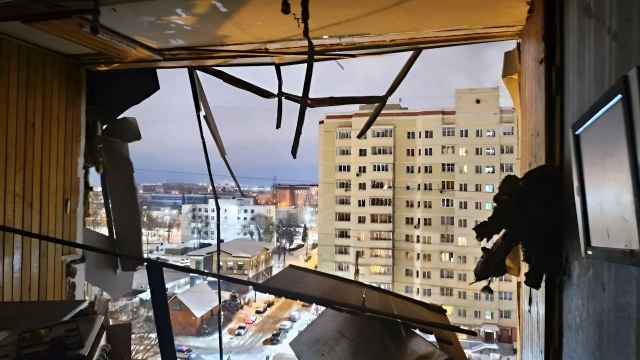SOCHI — Russia hopes that Syrian authorities and the UN will agree on international inspections to look into the possible use of chemical weapons in the country's civil war, Foreign Minister Sergei Lavrov said Friday.
"As far we know, the Syrian government … has expressed readiness — after that place near Aleppo is inspected — to consider requests for inspections in other parts [of the country] as well," Lavrov said after a meeting with UN Secretary General Ban Ki-moon.
"We hope that agreements will be reached between the UN Secretariat and the Syrian government. We are doing all we can to facilitate that."
Ban Ki-moon said the UN is urging Syria to allow experts into the country to investigate possible use of chemical weapons.
He also said he was not yet ready to set a timeframe for an international conference on Syria.
NATO Secretary General Anders Fogh Rasmussen said last Monday that the alliance has no information as to who could have used chemical weapons in Syria and expressed regret that Syrian authorities have not allowed UN inspectors into the country to look for evidence of their use.
A leading UN official on Syria said last weekend in an interview on a Swiss-Italian TV network that the UN commission investigating alleged human rights abuses in Syria has heard testimony that the rebels have used chemical weapons.
"According to the testimonies that we have collected, the rebels have used chemical weapons by using sarin gas," Carla Del Ponte of the UN commission investigating reported human rights abuses in Syria told Radiotelevisione Svizzera.
Del Ponte said the accounts came from victims, doctors and field hospitals in neighboring countries, Reuters reported. She gave no further details about when or where sarin gas may have been used.
Government forces have accused the rebels of using toxic substances near Allepo on March 19, while the rebels accuse the Assad regime of using chemical weapons near Homs last December. According to defense publisher Jane's, Syria held large stocks of chemical and biological weapons before the current conflict broke out, including mustard gas, phosgene, and sarin and VX nerve agents.
Sarin is a highly toxic nerve agent, which was reportedly first used for military purposes during the Iran-Iraq war in the 1980s. The most infamous sarin gas attack was carried out by the members of Aum Shinrikyo group on the Tokyo subway, killing 13 and injuring hundreds.
Last month, the White House said in a letter to lawmakers that intelligence gathered by the United States with the help of opposition forces in Syria shows that the Syrian regime has used chemical weapons on a small scale, but this evidence was later questioned.
The two-year civil war in Syria has killed at least 80,000 people according to UN figures. The UN General Assembly approved a resolution on Wednesday supporting Syrian opposition forces, condemning Assad's use of force against civilians and calling for a political transition in a vote backed by the United States but rejected by Russia as "irresponsible."
Related articles:
A Message from The Moscow Times:
Dear readers,
We are facing unprecedented challenges. Russia's Prosecutor General's Office has designated The Moscow Times as an "undesirable" organization, criminalizing our work and putting our staff at risk of prosecution. This follows our earlier unjust labeling as a "foreign agent."
These actions are direct attempts to silence independent journalism in Russia. The authorities claim our work "discredits the decisions of the Russian leadership." We see things differently: we strive to provide accurate, unbiased reporting on Russia.
We, the journalists of The Moscow Times, refuse to be silenced. But to continue our work, we need your help.
Your support, no matter how small, makes a world of difference. If you can, please support us monthly starting from just $2. It's quick to set up, and every contribution makes a significant impact.
By supporting The Moscow Times, you're defending open, independent journalism in the face of repression. Thank you for standing with us.
Remind me later.





